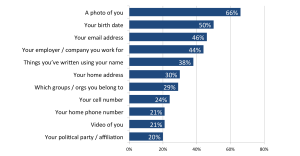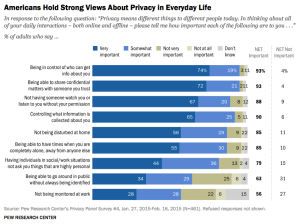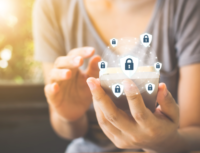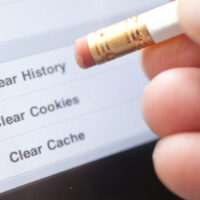Privacy is Situational
The balance of forces has shifted in the networked age.
People are now “public by default and private by effort.”
— danah boyd
I had the great privilege last week to hear Lee Raine from PEW reveal the recent findings on consumers’ concept of privacy in today’s hyper connected digital and technology driven world.

The research findings demonstrate that privacy has truly become situational. We are open to sharing and providing our private information, within limits, if we are going to get something out of it.
Many openly worry in conversations about the information that is available. However, most in today’s world have a Linked-In profile and an account on FaceBook to stay in touch with friends and family. Some perhaps share “clips” on Pinterest, post pictures to Instagram or even Tweet about the subjects they hold dear.
Most are walking around with a debit card and a few credit cards and using them for all of their purchases to gain miles, credit and points. Some baby boomers and Gen X are concerned about sharing and including their credit card information in an “app” like Uber. They will, however, freely swipe their cards at a store or parking meter.
I would argue is there really a difference? Your purchasing behaviors and activities one-way or another are being tracked. Your credit card number is just as likely to get lifted from the card reader in the store or parking meter as it is from the “app”.
Your purchasing behaviors and your private information are just as likely to be managed, mined and sold by your credit card company.
How often these days do you go to a store or restaurant and get asked to join their “rewards” program.
“All you need to share is your name, email address, home address, birth date and phone number”
So you fill out the card or form for the promise of discounts, coupons and notices of events. Hey, I think they have a wine tasting next week.
You say or think: oh, this is a no brainer.
Did you stop and think about what you were doing and what information you were sharing?
Most likely not.
The benefit of getting something, saving money or feeling a part of the club was the driver in your decision-making.
You think: ok I can delete the emails from my box unless of course I see that one has a coupon. No harm, no foul.
Did you stop and think, “whoa”, why do I keep getting those calls on my home and cell phones? Where did X or Y organization get my numbers?
You think: I somehow have wound up on a list.
That somehow is most likely traced back to your own actions. Perhaps you don’t remember because you were more focused in the moment on the promise of the discount, coupon or notice of events.
Might that be the case?

The personal data that you gave them adds to all of the other data in the store or restaurant’s databases and perhaps, well not perhaps, it is highly likely your data is then sold off to a data or marketing service and becomes part of lists and databases way beyond the initial store or restaurant.
The world today is data driven and data is brokered, sold and mined every second of every day. Digital has created a myriad of opportunities.
So lets do a bit of a reality check. It is a fact that a good portion of your personal information is already out there in the hands of those you wouldn’t expect.
A portion of your Linked In profile is public and indexed by the search engines. A portion of you Facebook profile is public and perhaps all of your activity is freely available if you haven’t set the appropriate privacy setting.
Have you replied to a tweet?
Have you created a review on Yelp?
Posted a trip idea on Trip Advisor?
Ok, I hope you get the point.
Lee Raine reported that the research proved only 1/3 of the population has checked their name and personal information on the major search engines. I find that really interesting in today’s digital world and would have thought it to be higher.
The millenials know what is out there and despite their openness with sharing and communicating, they know they need to “Clean up” their act when necessary. The research demonstrated that millenials check and attempt to scrape their information in preparation of major life events (applying to schools or a job). Anyone’s challenge in “cleaning up” is that the deep sea of the Internet rarely gives up its bounty.

What is out there?
The respondents shared interesting information in response to one of PEW’s research questions. The chart demonstrates what personal information people know is online and are ok with it or at least resign to the fact.
I am one of those people who have it “all” out there and can check every box on the list below. I am ok with what is out there, the information goes with who I am and what I do. It is important to my business. My day to day is spent in the marketing, digital, data science and business strategy realms. I truly see both sides of the equation.

So lets add a challenging dynamic to the mix. Americans hold strong views about privacy in everyday life despite freely giving away their data where they perceive a gain or benefit.
The American people want to be in control of who can get their data. But how can laws or policies be structured that contend with what is already happening and well ingrained in the world?
Over half of the American people don’t want to be disturbed at home but how do you define home in the digital age? Televisions are connected, people are interacting with two screens at one time (TV, Tablet, Smartphone and/or laptop) and are surfing the web, tweeting, shopping or researching a show or some type of information from their couch.
If you multi-task in this way, in your home, do you often find yourself filling out a form? Clicking on an Ad (delivered based on your browsing history)?
Where and how do you start when it is ultimately a personal decision.

I am not here today to steer that discussion one way or the other. It is complicated.
The Pew research demonstrates how complicated the issue and conception of privacy have become. As the World moves further into the Internet of Things (IoT), the issue and conception are only going to get more complicated.
Privacy is situational and a highly personal decision. A consumer should educate themselves and be in the know of how their information is used, can be used and how it travels across the deep sea of the Internet.
You as a consumer are indeed in the driver seat!
Data and Analytics are increasingly important for all organizations. 2040 Digital is here to help you navigate your strategies and plans to the desired outcomes. Contact Us.
If you want to learn more about the how, what, when, where and why organizations are seeking and using your data, check out 2040 Digital’s posts on Customer Experience and Data and Analytics Strategy.
More Information from PEW:
- Americans’ Attitudes About Privacy, Security and Surveillance
http://www.pewinternet.org/2015/05/20/americans-attitudes-about-privacy-security-and-surveillance/
- Americans’ Privacy Strategies Post-Snowden
http://www.pewinternet.org/2015/03/16/americans-privacy-strategies-post-snowden/
- Public Perceptions of Privacy and Security in the Post-Snowden Era
http://www.pewinternet.org/2014/11/12/public-privacy-perceptions/
- The Future of Privacy
http://www.pewinternet.org/2014/12/18/future-of-privacy/
- Anonymity, Privacy, and Security Online
http://www.pewinternet.org/2013/09/05/anonymity-privacy-and-security-online/





